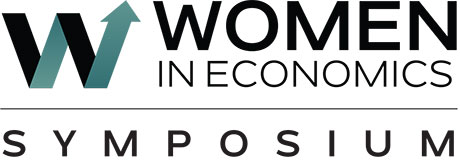Women in Economics Symposium
Women in Economics Symposium
Our 2025 symposium originally scheduled for March 27 has been postponed. We apologize for any inconvenience this postponement may cause.
History of the Women in Economics Symposium

This annual symposium began in 2018 at the St. Louis Fed, along with the Women in Economics podcast. This initiative was designed to connect young women with accomplished women in the economics profession who share the story of their career journey—helping inspire women who wonder if economics is a profession they should (and actually could) pursue.
2024
The 2024 event featured Adriana Kugler, Federal Reserve Board Governor, and Oksana Leukhina, economic policy advisor at the Federal Reserve Bank of St. Louis. The symposium hosted roughly 2,000 attendees in person and virtually via watch parties around the country.
2023
The 2023 event, held in person for the first time since 2019, featured Stephanie Aaronson, senior associate director of the Division of Research and Statistics at the Federal Reserve Board of Governors, and Daryl Fairweather, chief economist at Redfin.
2022
The 2022 event featured Betsey Stevenson, professor of public policy and economics at the University of Michigan; Tisha Emerson, professor of economics, Baylor University; Kristen Broady, director of the Economic Mobility Project at the Federal Reserve Bank of Chicago; Marie T. Mora, associate vice chancellor for strategic initiatives at the University of Missouri-St. Louis; and Stacey Vanek Smith, host of “The Indicator” from Planet Money.
2021
The 2021 event, held virtually, featured Lisa D. Cook, professor of economics and international relations at Michigan State University; Brigitte Madrian, dean and Marriott Distinguished Professor at the Brigham Young University Marriott School of Business; Marie T. Mora, provost and executive vice chancellor for academic affairs at the University of Missouri-St. Louis; Nancy Rose, Charles P. Kindleberger Professor of applied economics at MIT; and Abigail Wozniak, director of the Opportunity and Inclusive Growth Institute at the Federal Reserve Bank of Minneapolis.
2020
The 2020 event, held in Cleveland, featured Julianne Malveaux, Ph.D., president emerita of Bennett College for Women, and Lisa D. Cook, professor of economics and international relations at Michigan State University.
2019
The 2019 event, held in St. Louis, featured Loretta Mester, president and CEO of the Federal Reserve Bank of Cleveland; Amanda Bayer, professor of economics at Swarthmore College; and Kate Warne, principal and investment strategist at Edward Jones.
2018
The 2018 inaugural event, held in St. Louis, featured Mary Daly, executive vice president and director of research at the Federal Reserve Bank of San Francisco.

